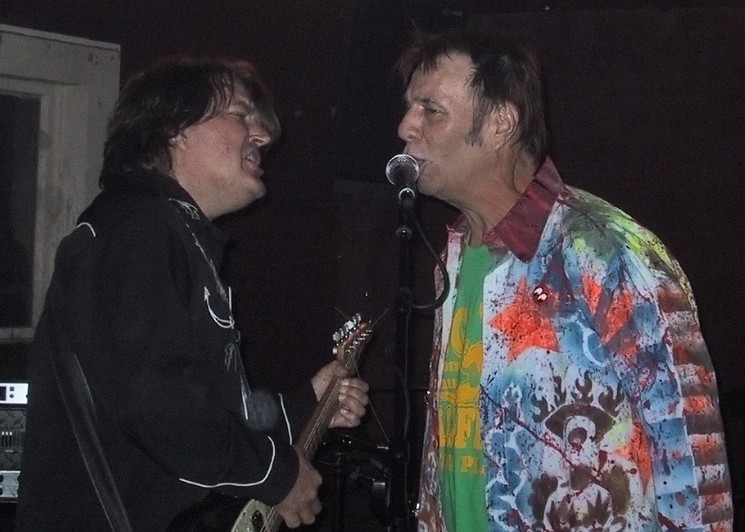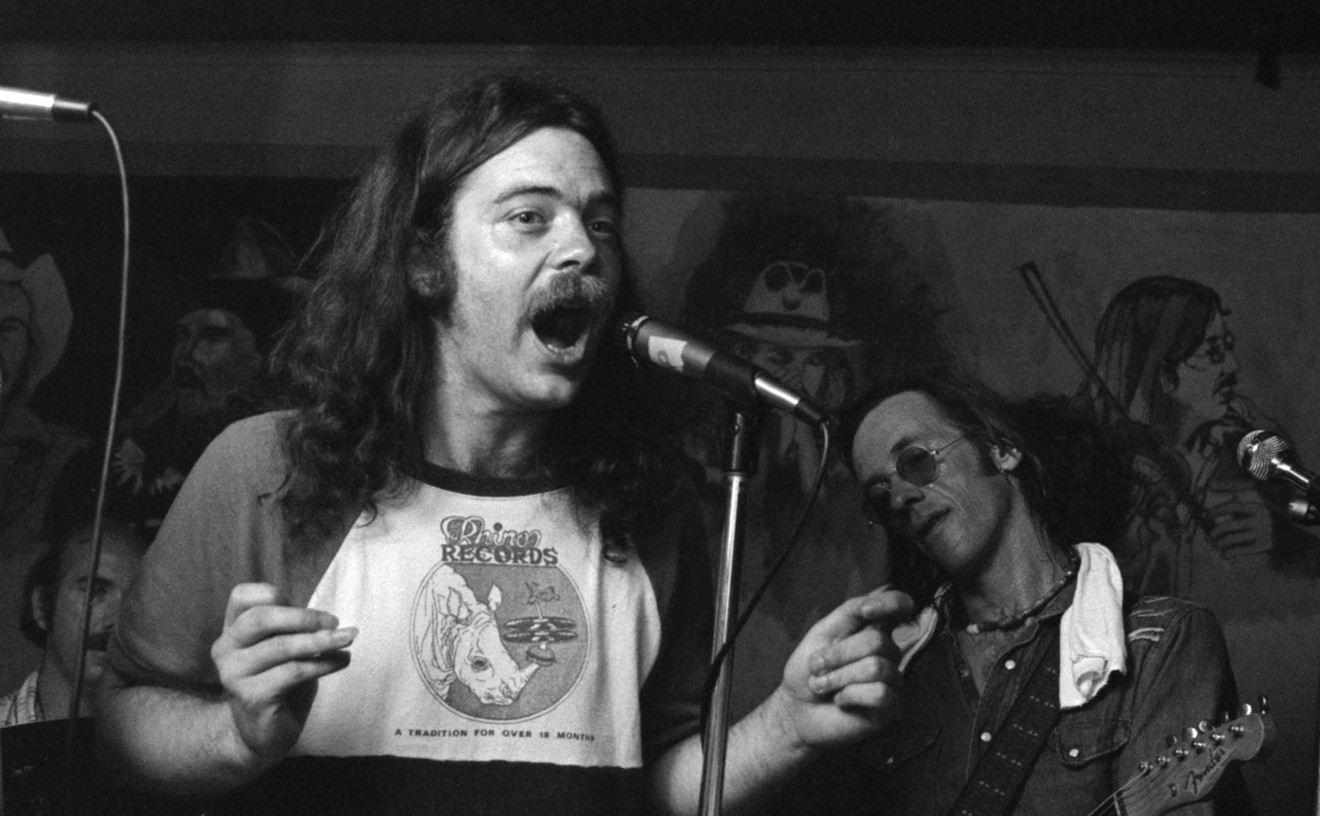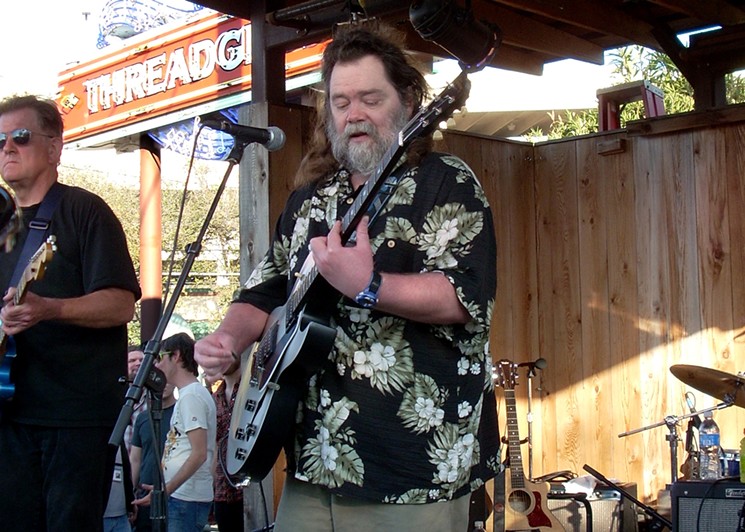Of all of them, he remained enigmatic, misunderstood, darkly luminescent, wounded, and prolific, despite all-too-often hardships. In a career that went sideways more than once, he was a towering figure that cut though the fog of music trends.
One of the first scene makers I contacted to gauge Erickson’s legacy was Jeff Smith, unbridled singer of hellacious cow-punk Hickoids and label honcho behind Saustex Records. “Roky’s case ... was a combination of drugs and outsider art. I saw Roky everyday for a period of about two or three months in 1985 in Austin,” he initially told me in 2015 as we discussed homegrown Texas experimental rock.
“He lived with Mike Alvarez, who I staged the old Woodshock festivals with. He’s a sweet man, and it’s sad to see someone of his genius that marginalized. Music is the product of individual imaginations and personalities, and in Roky’s case, I believe, fate. That it all came out of Texas was happenstance.”
Smith added this this week: "He had the rare gift to sell any variety of subject matter with his voice, be it a love song, a B-movie inspired tune, or his own spiritual meditations. I think it's very telling of his psyche that he was able to do so. All of those things were real in some corner of his brain. I don't see how he could have sung them without ever seeming campy, contrived, or consciously ironic if they weren't."
In addition to gulping down prolonged, persistent mind-altering drugs, part of Erickson’s enigma can be chalked up to a spirit that remained stubbornly in flux: he flipped from the devotion of a Christian believer to heeding Satan, as noted on the tune “I Am.” Next, he candidly told a television interviewer that he genuinely felt like an alien. In the end, he leveled-off as a crooning song man that kindled the habits of love. Sometimes those mutated worlds converged on tunes like “Devotional Number One,” which avows “Jesus is not a hallucinogenic mushroom.”
As a benchmark for deep-psych music, barely a smidgen of the commonplace touched him. Even more so, Erickson contained multitudes.
He could yawp across crowded clubs and howl like a cavorting banshee, far more intense than Jim Morrison’s smoldering somnambulism. He often squeezed poetry from monster movie scenarios (Night of the Vampire) and the outer limits (Creature with the Atom Brain) and effortlessly licked together Bob Dylan-style fragmented prose on tunes like “Warning (Social and Political Injustices)." Earlier, in fact, the 13th Floor Elevators faithfully covered Dylan's “It’s All Over Now, Baby Blue.”
He could also issue hard-bitten rock’n’roll (“It’s a Cold Night for Alligators” as well as Velvet Underground’s “Heroin,” which he sped-up); take-no-prisoner punk-leaning assaults (“If You Have Ghosts”); and pop gems with wide-eyed verve (“Starry Eyes,” re-cut in 2017 with Lou Ann Barton). Unbelievably, he could even create compelling music from a single line — “I walked with a zombie” — repeated ad infinitum.
First, however, we must go back a bit.
The 13th Floor Elevators exuded the clean-cut visual appeal of skinny lads from the right side of town. At the head of the pack, Erickson was both telegenic and telepathic, transmitting from the frequencies of the Third Eye.
Their music – demented, hazy, swelling rock’n’roll nuggets buzzing with distortion and murk – was epitomized in the seismic jukebox fare of “You’re Gonna Miss Me.” It soon became a staple diet in underground music, including an irreverent version by The Mono Men during the heyday of grunge.
Locally, in the spring of 2005, at Rudyard’s in the heart of Montrose, lucky onlookers witnessed a joint delivery of the song by Randy “Biscuit” Turner, singer for the Texas punk-funk powerhouses Big Boys, and Peter Case of the Plimsouls, godfather of rootsy power-pop, who joined each other on stage as I drummed.

Peter Case (Plimsouls) and Randy "Biscuit" Turner (Big Boys) sing "You're Gonna Miss Me" at Rudyard's, Spring 2005
Pic by Ken Hoge / www.kenhoge.com
On bass that night, borrowed from Zipperneck, was Mel Hell, who more recently has been gigging with the Texas Mod Crushers. “From the cat scratch opening guitar to the painful wail of Roky’s voice on “You’re Gonna Miss Me,” the first time I heard the song I made up my mind about the kind of garage rocker I would become," she avowed to me. Eventually, the Houston Press featured her in a front cover story about her local career. "Rest in peace, Roky, and long live the electric jug!” she exclaimed after summarizing her impressions.
Ongoing police issues and mental instability, including post-Elevators stints in both Austin State Hospital and Rusk State Hospital, led Erickson to electroconvulsive therapy (“electricity hammered me / through my head / ‘till nothing at all / is backwards instead” he later sang). Doctors also prescribed Thorazine regimens as ways to mitigate his schizophrenia, which always placed him on the shrinking ledge of reason.
Despite those wrenching bouts with modern psychiatry, Erickson forged ahead and experienced musical ups and downs, like brief and exhilarating come-backs with backing bands the Aliens and the Explosives at venues like Raul’s and the Continental Club in Austin. They produced music that swung hard, picked through his past, and produced unforgettable cuts.
“Bert, Doug, and I from Re*Cords (Reversible Cords) practiced with Roky maybe four or five nights at a vacant house owned by our manager Phil Lenihan,” explained drummer Tom Huckabee, who formerly pounded the skins for the Huns, in Spring 2018. “We learned ten of the songs that ended up on Roky Erickson and the Aliens (1980), including “Creature With the Atom Brain,” “The Damned Thing,” “I Walked with a Zombie” “Two Headed Dog” and “Bermuda.” For some reason, before the first rehearsal, Bert, who normally played organ, picked up the bass, and Doug switched from guitar to organ. Roky was not impressed by our chops, admonishing us strictly: ‘You’ve got to get the beat, the notes, and the chords.’”
“Nonetheless, we played a sold-out show at Raul’s on May Day 1979. Roky ignored our ineptitude on stage,” Huckabee recalled, “delivering an electrifying and professional performance. After we finished all the songs we’d rehearsed, he launched into two encores, including “Roll Over Beethoven,” assuming we knew it; but the only cover songs we knew were his. Nonetheless, we galloped after him, supplying twelve-tone, arhythmic cacophony."
Drummer Arthur Hays, from the Next, now the drum kit backbone of locals Screech of Death, remembers that era as well.
“In 1979, a friend of mine, Bert Crews, who played in the Re*Cords told me that he had ran into Roky and his mom on the drag (Guadalupe St.)," he wrote to me. "Roky was on furlough from the state hospital that weekend. Bert also told me that he was going to book Roky at Raul’s several months out from that meeting on his next furlough. His mom had agreed to helping with the event. Well, it happened and it was great.”
“Davy Jones was there and made friends with Roky and his mom,” Hays continues. “She was such a beautiful person. Anyway, this was just after Davy had started his band The Ideals with my brother Dick Hays before they became members of The Next. It was six months to a year before Davy got a show with Roky, and they had asked me to drum (I wasn't an Ideal then). Davy picked Roky up at his mom's on the day of the show.”
“At Raul’s, me and Roky went out to the parking lot to smoke. We talked about the set list. Roky seemed distracted in his train of thought, and I was feeling that things might be tough on stage. Some hippies spotted and us and were ecstatic to make contact with him. During the jubilant chaos, Roky snatched up and swallowed four hits of acid. Of course, my heart just hit the floor.”
“The first band was playing when we entered Raul’s, and I told Davy what had happened. He freaked! We made plans to play through the set regardless. We had practiced the album without Roky, and we would stick to it. When we got on stage, Roky had mellowed out and wasn't talking. First note, Roky came alive on guitar. When he stepped up to sing, his voice was perfect and loud. Jones, Dick, and I went from shock to full blown rock. It was fantastic. Roky was having a blast and put on a great show. Several times he turned to face me with a huge smile and would lean over the drums and yell, ‘That acid's a motherfucker!’"
“I had never played on stage with someone with that much power and techniques in vocals. The best in the country. And a testament for better living through chemistry!” argues Hays.
Soon, though, money woes and debilitating obsessions, including hoarding his neighbors' unopened mail, again nearly sunk Erickson. Eventually, a younger brother wrangled the legal rescue of Erickson, documented in the award-winning film You’re Gonna Miss Me in 2005, so the bedraggled visionary began to find a new footing.
“My first Roky show was at the Island, Roky Erickson and The Explosive, in early '80s. Seen him numerous times since,” says J.R. Delgado, former member of many notorious local punk bands, including Doomsday Massacre, Party Owls, and more recently Screech of Death and the Crusties. “The most notable show was his last reunion at the Austin Psych Fest couple years ago when jug-player Tommy Hall performed, who had not performed with 13th Floor Elevators since their break-up.”
“Roky was our pioneering psychedelic garage/punk/rock icon with genius lyrics. Considering all he went through, with drug use, drug bust, committed to a mental institution, recoveries, it’s amazing he was able to move forward,” Delgado insists.
“Then after seeing the documentary on his life where he would have multiple TVs on, some with just white noise, with his reason being it stops the voices in his head, I always wondered if those voices were with him when he performed live. Some shows were amazingly beautiful, some were suspenseful, like waiting for something tragic to happen at any moment. This beautiful enigmatic beam of colored lights is out now, but his music will live forever.”
That cogent impact on the punk generation was felt long and wide, including Mike Watt, whose Minutemen covered “Bermuda” on their Ballot Result album. And as simmering solo artist, Watt’s breathless version of “Sweet Honey Pie,” with added bass dollops, has become a crowd favorite.
“With the Black Gang, I also did "I Have Always Been Here Before" by Roky,” Watt emailed me. “I just loved the man's songs, voice and words so much ... just reached me in places other stuff didn't. I can't really explain it cuz it's beyond all that.”
“Listening to Roky lots of times brought feelings not brought by most stuff I hear, that's my statement,” he continued. “It wasn't calculated, it came out of the blue, but what I feel when I hear Roky does not need struggle; it reaches me in ways beyond my knowing. It's really trippy, and I will always love him for that."
And then Gary Floyd, gay-punk hero of rumbling rockers Sister Double Happiness (and earlier, the Dicks), released an unrelenting version of “Red Temple Prayer (Two Headed Dog) on the 1990 tribute LP Where the Pyramid Meets the Eye featuring R.E.M. and a milieu of indie and alt-rock bands.
“Doing the tribute album was one of the lifetime honors in my music journey, “ Floyd recently told me. “I demanded that song. What a huge personality and huge influence, and I wonder if he knew. I hope.”
That’s the power of Erickson – his songs easily transcend. They cut across time in a quicksilver jolt of still-fresh attitude, wordplay, style, and delivery. Those qualities are in full-force on his Austin City Limits gig, readily found on YouTube, featuring both the Explosives, Erickson’s punk-era unit, as well as the long-bearded masterful maestro Billy Gibbons, of ZZ Top, who unleashes ear-boggling guitar solos. “To this day, Roky Erickson stands alone because he had the gift of that wonderful voice,” Gibbons told the documentary crew for You’re Gonna Miss Me.
“When I worked for Billy Gibbons, I recorded the ZZ Top version of “Reverberation (Doubt)” for the tribute compilation,” notes Dan Workman, from local art-cum-noise pioneers Culturcide and former owner of SugarHill Recording Studios, the same venue that recorded the 13th Floor Elevators decades earlier. “They were in a hurry to deliver, so he let me mix it, and the label loved it.”
“I am not credited as the engineer/mixer because I was not a name, but I’ve always been proud of that mix, and that it was an Elevators tune. Made me feel legit. By the way, we tried to record an electric jug part, put it didn’t feel right, so Gibbons just imitated the jug sound with his mouth.”
Erickson was the one that got away without true mass appreciation for his merit. His heart of darkness got in the way. And he became too esoteric, puzzling, even cryptic, for casual listeners used to ready-made ditties mass manufactured for lax ears.
Yet, “Levitation,” a signature tune by the 13th Floor Elevators, is utterly enrapturing. Textured and deeply-grooved, it has inspired an entire festival in Austin, where Erickson once attended school and first cut an impressive single with the Spades: an A-side with the original stripped-down version of “You’re Gonna Miss Me” and B-side featuring “We Sell Soul,” covered enthusiastically by Boston garage-rock juggernauts Lyres in 1990 on the tribute album.
And when uber indie rockers Okkervil River released impressionistic tunes like “Goodbye Sweet Dreams” with Erickson in 2013, his career arc seemed full and profound, especially as he leaned back into lyrics like “True Love Casts Out All Evil,” the signature song from their effort.
In the end, Erickson remained irrepressible, a stranger in a conformist land. With deft lyrical tendencies, he touched upon occult philosophies, history, pop culture, and personal calamity, as well as matinee movies, rock’n’roll, and his own psychosis.
Most people would have melted down, given up, crumpled. Lesser men did all the time. They ended up on the shoulder of the road. A side-note. A passe memory.
But due to his ductile anchoring to art, Erickson pressed forward and delivered his postcards from the edge. To some, the music will remain mesmerizing and bracing, eruptive, much like outsider visions.
Or, as Erik Westfall, singer and guitarist of 500 Megatons of Boogie, described to me, "Roky was both a chimera and explorer. A psychedelic Ulysses."
To others, though, Erickson will remain an impenetrable messenger of the Satanic overlord. And the music will remain a motley brew, as opaque as a metal-clad moon.
Too bad for them. Erickson stood with the gremlins, not the poseurs parading as normals.



